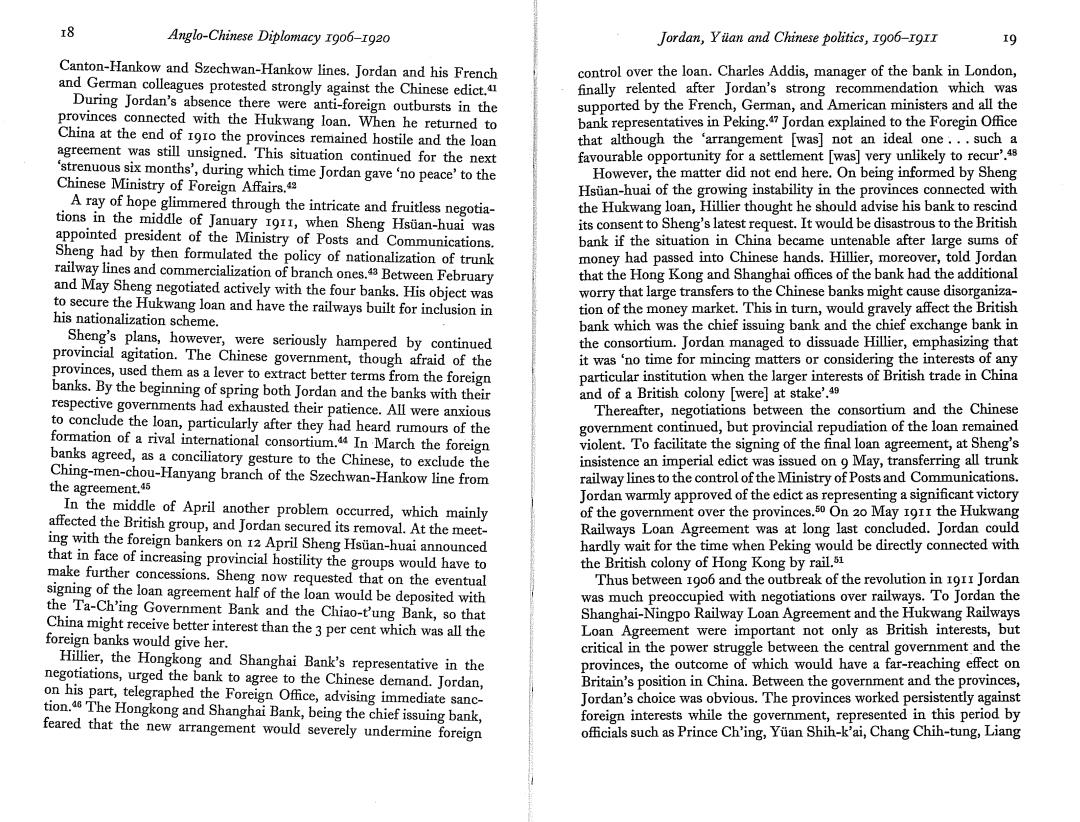正在加载图片...

18 Anglo-Chinese Diplomacy 19o6-1920 Jordan,Yiian and Chinese politics,I9o6-I9II 19 Canton-Hankow and Szechwan-Hankow lines.Jordan and his French control over the loan.Charles Addis,manager of the bank in London, and German colleagues protested strongly against the Chinese edict. finally relented after Jordan's strong recommendation which was During Jordan's absence there were anti-foreign outbursts in the supported by the French,German,and American ministers and all the provinces connected with the Hukwang loan.When he returned to bank representatives in Peking.47 Jordan explained to the Foregin Office China at the end of Igro the provinces remained hostile and the loan that although the 'arrangement [was]not an ideal one...such a agreement was still unsigned.This situation continued for the next 'strenuous six months',during which time Jordan gave 'no peace'to the favourable opportunity for a settlement [was]very unlikely to recur'.48 However,the matter did not end here.On being informed by Sheng Chinese Ministry of Foreign Affairs.43 Hstan-huai of the growing instability in the provinces connected with A ray of hope glimmered through the intricate and fruitless negotia- the Hukwang loan,Hillier thought he should advise his bank to rescind tions in the middle of January I9II,when Sheng Hstan-huai was its consent to Sheng's latest request.It would be disastrous to the British appointed president of the Ministry of Posts and Communications. bank if the situation in China became untenable after large sums of Sheng had by then formulated the policy of nationalization of trunk money had passed into Chinese hands.Hillier,moreover,told Jordan railway lines and commercialization of branch ones.43 Between February that the Hong Kong and Shanghai offices of the bank had the additional and May Sheng negotiated actively with the four banks.His object was worry that large transfers to the Chinese banks might cause disorganiza- to secure the Hukwang loan and have the railways built for inclusion in his nationalization scheme. tion of the money market.This in turn,would gravely affect the British bank which was the chief issuing bank and the chief exchange bank in Sheng's plans,however,were seriously hampered by continued the consortium.Jordan managed to dissuade Hillier,emphasizing that provincial agitation.The Chinese government,though afraid of the it was 'no time for mincing matters or considering the interests of any provinces,used them as a lever to extract better terms from the foreign particular institution when the larger interests of British trade in China banks.By the beginning of spring both Jordan and the banks with their and of a British colony [were]at stake'.49 respective governments had exhausted their patience.All were anxious Thereafter,negotiations between the consortium and the Chinese to conclude the loan,particularly after they had heard rumours of the formation of a rival international consortium.44 In March the foreign government continued,but provincial repudiation of the loan remained violent.To facilitate the signing of the final loan agreement,at Sheng's banks agreed,as a conciliatory gesture to the Chinese,to exclude the insistence an imperial edict was issued on 9 May,transferring all trunk Ching-men-chou-Hanyang branch of the Szechwan-Hankow line from railway lines to the control of the Ministry of Posts and Communications. the agreement.45 Jordan warmly approved of the edict as representing a significant victory In the middle of April another problem occurred,which mainly affected the British group,and Jordan secured its removal.At the meet- of the government over the provinces.50 On 20 May IoII the Hukwang Railways Loan Agreement was at long last concluded.Jordan could ing with the foreign bankers on I2 April Sheng Hstan-huai announced hardly wait for the time when Peking would be directly connected with that in face of increasing provincial hostility the groups would have to make further concessions.Sheng now requested that on the eventual the British colony of Hong Kong by rail.51 Thus between 19o6 and the outbreak of the revolution in IoIr Jordan signing of the loan agreement half of the loan would be deposited with the Ta-Ch'ing Government Bank and the Chiao-t'ung Bank,so that was much preoccupied with negotiations over railways.To Jordan the China might receive better interest than the 3 per cent which was all the Shanghai-Ningpo Railway Loan Agreement and the Hukwang Railways foreign banks would give her. Loan Agreement were important not only as British interests,but critical in the power struggle between the central government and the Hillier,the Hongkong and Shanghai Bank's representative in the negotiations,urged the bank to agree to the Chinese demand.Jordan, provinces,the outcome of which would have a far-reaching effect on Britain's position in China.Between the government and the provinces, on his part,telegraphed the Foreign Office,advising immediate sanc- tion.4 The Hongkong and Shanghai Bank,being the chief issuing bank, Jordan's choice was obvious.The provinces worked persistently against feared that the new arrangement would severely undermine foreign foreign interests while the government,represented in this period by officials such as Prince Ch'ing,Yuan Shih-k'ai,Chang Chih-tung,Liang